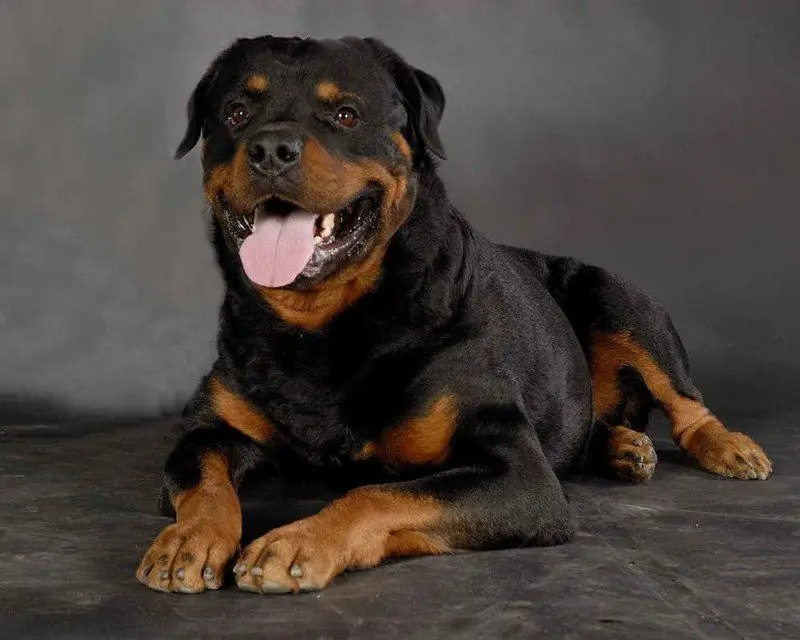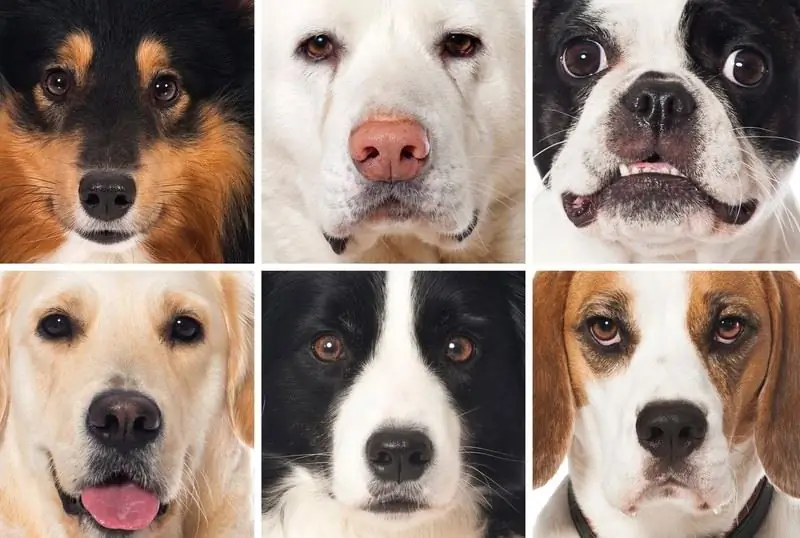
Table of contents:
- Author Bailey Albertson albertson@usefultipsdiy.com.
- Public 2023-12-17 12:53.
- Last modified 2025-01-23 12:41.
9 dog breeds that are dangerous to have in a family with a child

For many, a dog is an unfulfilled childhood dream. And in response to the child's requests for a four-legged friend, the parents are seriously thinking about the pet. But if the family has small children, it is worth considering the choice carefully, given the ability to get along with the child. Some dog breeds require strict training and do not reckon with children's love of play.
Great Dane

Calm and smart dogs would make a great friend, but they are not at all suitable for young children. Having high growth, great weight and developed muscles, such dogs can simply injure the baby, squeeze him.
They also require a special approach, the ability to negotiate and competently give commands. The child will not cope with this, and with aggressive behavior, the dog can be perceived as an enemy.
Rottweiler

Rottweilers are calm, well-mannered and non-aggressive animals. They are loyal to their master, lend themselves well to training and carry out commands without problems.
But the main problem with Rottweilers is that they know how to make their own decisions and protect the owner in case of danger. And as a leader they choose an ordinary one adult.
The dog will be a great friend to the kid, but it may misunderstand the games and suddenly attack him.
You cannot leave the baby alone with this breed, as the dog will not obey its commands, it can knock down, eat or start taking away toys. Also, if the owner punishes the dog, then it can harbor a grudge.
American Pit Bull Terrier

One of the most aggressive breeds, which is dangerous even for adults. This is a hunting and fighting dog, completely not intended for keeping at home.
In case of danger, she rushes at a person and does not let go until she has dealt with him. Despite the intelligence and upbringing, the Pit Bull Terrier is able to bite a child who is too mobile and aggressive.
Also, children love to stick their fingers into the mouth of a dog, hang around their neck and roll with them on the floor. This can result in serious injury.
St. Bernard

St. Bernards are not aggressive, love active games and easily find a common language with children. They are kind, caring, but require thoughtful upbringing.
The main problem of this breed is the size of the animal and too cheerful disposition. St. Bernards, in fits of joy, love to jump on people.
The dog will easily drop and scare the child, can injure him with the weight of his body. It makes sense to start this breed if the baby has already grown up, since a four-legged friend will become an excellent companion for him.
Toy Terrier

Small and very cute terriers require a special approach. They cannot stand noise, fuss and disrespectful attitude towards their person.
Also, they should not be scared, pressed and shaken. An adult's toy terrier will easily sit on his hands, but will not tolerate if a child starts to ruffle his neck, pull his tail and climb into his mouth. In response, he will begin to bark loudly and may bite the baby.
Also, a child is a competitor for a small dog and makes her jealous. If the beloved owner pays attention to the young offspring, then the terrier can be very offended, get sick, or start showing discontent.
Akita Inu

Such dogs are very wayward, demanding respect for themselves and constant education. They are aggressive towards strangers, can throw themselves at other dogs or small children.
Even if the Akita Inu behaves adequately at home, then you can hardly send the baby with her for a walk. The dog will most likely break off the leash or drag the baby along.
Also, the dog will not tolerate aggression, rudeness and incorrect behavior. She believes that the child is below her in the family hierarchy. In response, the Akita Inu can start attacking, biting.
Siberian Husky

Husky is now one of the most popular breeds, but there are big problems behind its cute appearance. This dog is difficult to train, so it behaves like a big child.
She needs to run a lot in order to put her energy somewhere. Otherwise, the husky will begin to destroy the house and play with everything that gets in its way.
She easily enters into games and perceives children as equals, but at the same time she cannot evaluate her own dimensions and behave delicately with the baby.
It is incredibly difficult to teach your husky the correct behavior, so you should not take the risk and have such a dog if you have small children.
Fox terrier

Small hunting dogs are too energetic and have a strong grip. Even if they are trained, they can play with the child, stop controlling themselves and bite him hard.
They also have a habit of grabbing the victim and dragging it along. Despite its small size, the Fox Terrier can easily cope with the baby and greatly scare him.
Also, this breed has rather sharp claws, which the dog often releases. She can severely scratch the child while playing.
Chow Chow

Phlegmatic and sluggish Chow Chows are not as sweet and calm as they seem. They do not like to carry out commands, they often snap, bark and bite.
Chow-chow will not obey the child on a walk, will not adequately respond to his calls for games or attempts to lie on top. These are rather grumpy dogs that are more suitable for retirees than for a young family.
Recommended:
Dogs For An Apartment: Best Breeds, Small And Medium, Photo

Criteria to consider when choosing a dog for an apartment. An overview of the 15 most common "apartment" breeds
The Most Dangerous Dog Breeds In The World

What breeds of dogs are considered the most dangerous. Description of these animals, their features and photos
Popular Dog Breeds In Russia And The World - Photos, Names, Descriptions

Which dogs were the most in demand in 2019. Brief description of popular breeds
The Smartest Dog Breeds, Easy To Train

What breeds of dogs are easy to train and are very intelligent
Dog Breeds That Need Shoes And Overalls In Winter

Sometimes the winter cold takes not only people by surprise, but also dogs. Dog breeds that can't do without a warm wardrobe in winter
